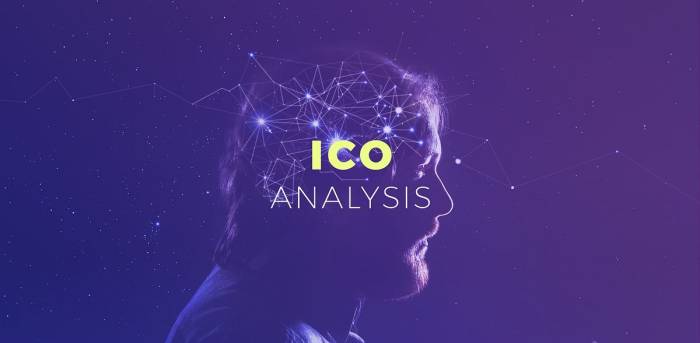ICO analysis takes the spotlight, giving you a peek into the world of cryptocurrency investments. Get ready to dive deep into the factors that make or break an ICO project.
Exploring everything from team expertise to legal considerations, this guide will equip you with the knowledge needed to navigate the complex terrain of ICO investments.
Introduction to ICO Analysis

Initial Coin Offering (ICO) is a fundraising method used by cryptocurrency startups to raise capital by issuing tokens to investors. These tokens can then be traded on various cryptocurrency exchanges.
Before investing in an ICO, it is crucial to conduct thorough analysis to evaluate the project’s viability, team expertise, technology, market potential, and token economics. This analysis helps investors make informed decisions and avoid potential scams or failed projects.
Examples of Successful ICO Projects
- Ethereum: Ethereum’s ICO in 2014 raised over $18 million and introduced the concept of smart contracts, revolutionizing the blockchain industry.
- EOS: EOS conducted a year-long ICO in 2017-2018, raising over $4 billion and launching a scalable blockchain platform for decentralized applications.
- Tezos: Tezos raised $232 million in 2017, focusing on on-chain governance and smart contract functionality, leading to a successful project launch.
Factors to Consider in ICO Analysis
When conducting an ICO analysis, there are several key factors that investors should carefully consider in order to make informed decisions. These factors can greatly impact the success or failure of an ICO project. Let’s delve into some of the most crucial aspects to evaluate when analyzing an ICO.
Team Expertise
The expertise and experience of the team behind an ICO project play a significant role in its success. Investors should research the backgrounds of the team members, their previous achievements, and their level of expertise in the blockchain and cryptocurrency space. A strong and knowledgeable team is more likely to deliver on their promises and navigate challenges effectively.
Project Concept
The uniqueness and viability of the project concept are essential considerations in ICO analysis. Investors should assess whether the project solves a real-world problem, offers a competitive advantage, and has a clear value proposition. A solid project concept with a strong use case is more likely to attract investors and achieve long-term success.
Tokenomics
Tokenomics refers to the economics of the tokens issued in an ICO, including their distribution, supply, and utility. Investors should evaluate the tokenomics of an ICO to determine its potential for value appreciation and sustainability. Factors such as token allocation, lock-up periods, and token utility within the ecosystem can impact the long-term success of the project.
Market Demand
Assessing market demand is crucial in ICO analysis to determine whether there is a genuine need or interest in the project’s product or service. Investors should research the target market, competition, and potential user base to gauge the demand for the project. A strong market demand indicates a higher likelihood of adoption and growth for the ICO project.
Role of Whitepapers and Roadmap
Whitepapers and roadmaps are essential documents that provide detailed information about an ICO project’s vision, technology, token economics, and roadmap for development. Investors should carefully review the whitepaper to understand the project’s fundamentals, goals, and implementation strategy. The roadmap Artikels the project’s milestones, timelines, and key deliverables, allowing investors to track progress and assess the project’s development trajectory.
Comparison of ICO Rating Platforms
There are various ICO rating platforms that provide evaluations and ratings of ICO projects based on different criteria and methodologies. Investors should compare and contrast these platforms to gain a comprehensive understanding of an ICO’s potential and risks. Factors to consider when evaluating ICO rating platforms include transparency, credibility, track record, and alignment with personal investment goals.
Technical Analysis in ICOs
When it comes to evaluating the viability of an ICO project, technical analysis plays a crucial role in providing insights into the potential success of the venture. By examining the technical aspects of the project, investors can make more informed decisions and assess the overall health of the ICO.
Importance of Technical Analysis
Technical analysis helps investors understand the underlying technology of an ICO project, including its blockchain infrastructure, smart contracts, and security protocols. By analyzing these technical components, investors can gauge the project’s scalability, functionality, and potential for long-term success.
- Blockchain Infrastructure: Evaluating the quality and efficiency of the project’s blockchain technology is essential in determining its reliability and sustainability.
- Smart Contracts: Assessing the functionality and security of the smart contracts used in the ICO can reveal potential vulnerabilities or weaknesses in the project.
- Security Protocols: Understanding the security measures implemented by the project can help investors assess the level of protection against cyber threats and hacks.
Common Technical Analysis Tools, ICO analysis
In ICO analysis, several technical analysis tools are commonly used to evaluate the project’s technical aspects. These tools provide valuable insights into the project’s technical capabilities and potential risks.
- Whitepaper Analysis: Reviewing the project’s whitepaper can provide detailed information about the technical architecture, features, and use cases of the ICO.
- Code Review: Examining the project’s codebase can help identify any bugs, vulnerabilities, or potential issues with the underlying technology.
- Community Engagement: Analyzing the project’s community involvement and developer activity can indicate the level of support and interest in the project.
Examples of Technical Analysis Indicators
When conducting technical analysis in ICO evaluation, investors often look for specific indicators that can provide valuable insights into the project’s technical health and potential for success.
- Network Activity: Monitoring the network activity of the ICO can reveal the level of adoption, usage, and overall interest in the project.
- Token Metrics: Analyzing the token metrics, such as distribution, supply, and demand, can help assess the project’s economic viability and market potential.
- Security Audits: Reviewing the results of security audits conducted on the project can indicate the level of security and reliability of the ICO.
Legal and Regulatory Considerations

When it comes to investing in ICOs, it’s crucial to consider the legal and regulatory landscape in different jurisdictions. The regulatory environment can have a significant impact on the success and security of ICO investments. Understanding the rules and regulations governing ICOs can help investors navigate potential risks and ensure compliance with the law.
Legal Framework Around ICOs
In various jurisdictions, ICOs may be subject to different laws and regulations. Some countries have embraced ICOs as a legitimate form of fundraising, while others have imposed strict regulations or outright bans. It’s essential for investors to be aware of the legal framework surrounding ICOs in the jurisdictions they operate in or plan to invest in. This can help mitigate legal risks and ensure compliance with relevant laws.
Impact of Regulations on ICO Investments
Regulations can have a significant impact on the success and viability of ICO investments. Stringent regulatory requirements may increase compliance costs for ICO issuers and limit the pool of potential investors. On the other hand, clear regulations can provide investors with greater confidence in the legitimacy of ICO projects and help prevent fraud and scams. Understanding the regulatory landscape can help investors make informed decisions and assess the risks associated with ICO investments.
Compliance Issues and Best Practices
Compliance with regulations is crucial for the long-term success of ICO projects. Best practices for ICO analysis include conducting thorough due diligence on ICO issuers, understanding the legal requirements in different jurisdictions, and ensuring transparency and accountability in project governance. By adhering to compliance best practices, investors can minimize legal risks and contribute to the overall credibility and sustainability of the ICO ecosystem.




